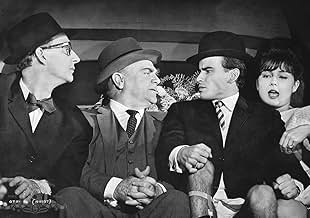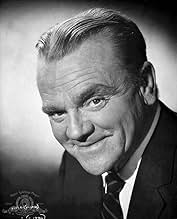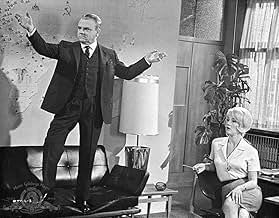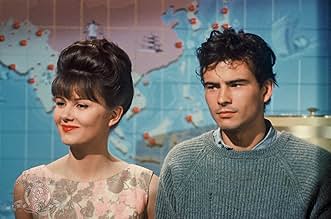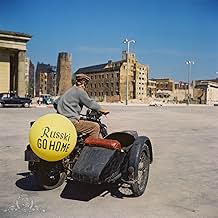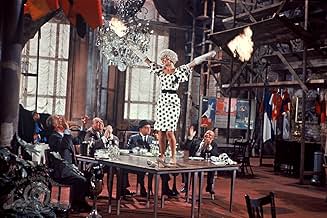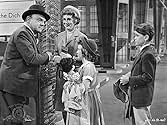Em Berlim Ocidental durante a Guerra Fria, um executivo da Coca-Cola tem a tarefa de cuidar da filha de seu chefe da alta sociedade.Em Berlim Ocidental durante a Guerra Fria, um executivo da Coca-Cola tem a tarefa de cuidar da filha de seu chefe da alta sociedade.Em Berlim Ocidental durante a Guerra Fria, um executivo da Coca-Cola tem a tarefa de cuidar da filha de seu chefe da alta sociedade.
- Direção
- Roteiristas
- Artistas
- Indicado a 1 Oscar
- 1 vitória e 8 indicações no total
- Fräulein Ingeborg
- (as Lilo Pulver)
- Melanie Hazeltine
- (as Lois Bolton)
- Krause
- (narração)
- …
- Cindy MacNamara
- (não creditado)
- Direção
- Roteiristas
- Elenco e equipe completos
- Produção, bilheteria e muito mais no IMDbPro
Avaliações em destaque
Billy Wilder's "One Two Three" is one of the greatest comedy films ever made. This wonderfully zany 1961 gem is a lightning-paced, hysterical farce (and with it's classic instrumental theme of "The Sabre Dance," you know you're in for a rollicking, rapid-fire comedy). Based on a French play, much of the movie plays out like a stage comedy, as Wilder simply turns his camera on the actors and lets them do their thing. The entire cast is simply superb, their comic timing perfect. James Cagney gives one of his all-time greatest performances as C.R. MacNamara. In almost every scene, with the bulk of the script on his shoulders, Cagney is sharp, quick on the draw, and just plain hilarious as the bewildered executive. Arlene Francis lends fine comic support as Cagney's sarcastic wife, Horst Buchholz is very funny & perfectly cast as the rebellious Otto, and the gorgeous Pamela Tiffin is simply a riot as the hot-blodded, dim-witted Scarlett. But ALL the actors in this movie are funny & terrific. Billy Wilder's direction is marvelous, and his script co-written with I.A.L. Diamond is clever and hilarious.
Some may find the quick pace of "One Two Three" a little exhausting, as the movie's energy level remains high from beginning to end, rarely stopping for air, but it works for me. This movie is pure farce, plain and simple. It makes no apologies for what it is, and it's goal is to make you laugh loudly. "One Two Three" is one of the most hysterical movies I've ever seen in my life, and it never fails to give me bellylaughs. Thank you Billy, Jimmy, and all the rest for this magnificent comedy gem.
For what was and what should have remained his swan song to the world of film James Cagney heads the cast in this. He's the man in charge of Coca-Cola's operations in Germany which is headquartered in West Berlin and he's had a lovely little present dumped in his lap. The daughter of the CEO of Coca-Cola is in Europe and now she's in Germany and he's expected to watch out for her. The daughter is played by Pamela Tiffin and she is one of the biggest airheads ever portrayed on the screen. She's fallen big time for a German kid played by Horst Bucholtz. They've gotten married.
Bucholtz is a kid who's real good at spouting all kinds of left wing slogans without delving to deeply into their meanings. He's a Communist and that drives Cagney nuts and if it drives Cagney nuts, Tiffin's father is sure to go over the top. Cagney takes it upon himself to get Bucholtz arrested on the East Berlin side as an American spy.
Of course a small memento of their married life has developed inside Tiffin so now Cagney has a real problem. He's got to get Bucholtz back and turn him into a money grubbing capitalist in his image. The frantic pace at which this is attempted, racing against the clock when Tiffin's father played by Howard St. John arrives in Berlin is what the rest of the film is about.
Wilder has a ball reducing the Cold War to its basic absurdities. The USA is symbolized by James Cagney who thinks the whole world will become America if only enough Coca-Cola is peddled. Cagney comes real close to proving it so.
The Communists come out far worse. Karl Marx's world always looked nice on paper, but always has had a real problem being converted into a functioning state. The Russians are also good at spouting the party line, but in One, Two, Three, Wilder shows how very easily they can be influenced by some of life's most elemental things and I don't mean Coca-Cola.
Cagney did not always get along with Wilder, but both men were professional enough to bury certain creative differences. Cagney was kind and patient with Tiffin who was getting her first real break in film. However he grew to positively loath Horst Bucholtz. In his memoirs which came out in the 1970s, Bucholtz was the only colleague who Cagney had anything really critical to say about.
During the middle of the film being shot, the Russians stopped the flow of traffic from West and East Berlin. Some shots had to be redone around the Brandenburg Gate, a whole set had to be constructed. I suppose a well trained cinema professional could spot the shots where the real and the fake Brandeburg were used. I sure can't. The following year, the Berlin Wall was built, so Wilder got his film done just in time.
Arlene Francis plays Cagney's exasperated wife and she of What's My Line does just fine. Cagney made an appearance on that show just before shooting started and gave the picture a big old plug.
The laughs come pretty fast and furious as James Cagney struggles mightily to prevent the arrival of "another bouncing, baby, Bolshevik."
But it was shown (letterboxed - "The only way to fly!") on Turner Classic Movies the other night and I quite enjoyed it, since it may now be enhanced somewhat at today's distant remove from the politics and the contemporary references of its period.
Cagney's performance is really amazing and it's not so surprising that this was his last major film role on the big screen. He must have been exhausted when filming wrapped!
The rest of the cast seems to be thoroughly in the service of what Wilder intended, which certainly wasn't subtlety, to say the least. And the production values and behind-the-scenes contributions (especially Andre Previn's witty score) are Class "A" all the way (except for that flat-looking studio mock-up of the air terminal interior, apparently necessitated by problems that couldn't have been foreseen).
It's not Wilder's best but it's a cut above (and then some) so much of the stuff that passes for comedy on the multiplex screens today.
From the time you hear the first few bars of "The Sabre Dance" thru the final shot of James Cagney, you are on a constant roller coaster, and you don't want to get off. It is a manic, wild movie that never disappoints or lets down.
The engine that drives this lunacy is James Cagney. In one of his best, funniest and energetic performances, he is nothing short of amazing. He is a whirling dervish, at the heart of a storm that he has no control over. I don't want to give any of the story away, suffice to say that he is nothing short of spectacular. In Cameron Crowe's book on Billy Wilder, Wilder laments that Cagney was so loud and energetic at the start of the film, that his character really has nowhere to go, in terms of building, and reacting to the chaos. I would agree with that assessment, but Cagney's performance does not let the audience stop and catch it's breath long enough for this to really be a factor.
Wilder and Diamond have brought us another gem. Is there another writing team that within a span of three years, have created three better pictures than the ones they have given us (Some Like It Hot, The Apartment, One,Two,Three)? I doubt it.
Kudos all around to the supporting cast as well. Especially, Arlene Francis, as Cagney's wife, and Lilo Pulver as his secretary. Also watch for some "inside" jokes. Like when Cagney threatens Horst Buchholz with a grapefruit, and Red Buttons, in a cameo, doing a Cagney imitation.
Great fun from start to finish. 10/10
The story concerns an American Coca-Cola executive, C.R. McNamara, heading up an office in Berlin who is asked by his boss to host his daughter (Pamela Tiffin). Hoping for a plum assignment in London, C.R. and his wife (Arlene Francis) welcome the young woman with open arms. She's southern, beautiful, flirtatious, and before they know it, she's got a Communist boyfriend (Horst Bucholz) Then he becomes her Communist husband, and that London promotion is looking less and less likely unless C.R. can pull off a miracle.
Wilder's direction for this was to have the dialogue shouted rather than spoken and to keep the film moving at a very fast pace. Admittedly this can get a little exhausting. Cagney gives a high-voltage performance and is extremely funny as the harried executive. And there are some hysterical bits as well as the madcap feeling of a '30s film. The rest of the cast is wonderful: Arlene Francis as C.R.'s long-suffering wife, Lilo Pulver as C.R.'s sexy secretary, and Hanns Lothar as Schlemmer, C.R.'s assistant who was "underground" during the war. ("The resistance?" "No, the subway. Nobody told me anything down there.") Though this was not a happy set - Wilder and Cagney had their differences, and Horst Buccholz was a major pain - the result is very good. Late in their careers, Wilder and Cagney still had it. Big time.
Você sabia?
- CuriosidadesThe film recorded a loss of $1.6 million. It didn't do well at either the U.S. or German box office because the story felt much more sinister in 1961 when the Berlin Wall was erected.
- Erros de gravaçãoSchlemmer calls his former superior officer in the SS "Herr Oberleutnant". The SS had no rank of Oberleutnant nor did its members call each other Herr. Oberleutnant was a German Army rank. The corresponding SS rank was Obersturmführer. In the German (dubbed) version, Schlemmer correctly addresses him as "Obersturmführer".
- Citações
Borodenko: When will papers be ready?
C.R. Macnamara: I'll put my secretary right to work on it.
Mishkin: Your secretary? She's that blonde lady?
C.R. Macnamara: That's the one.
Peripetchikoff: [after conferring with the others] You will send papers to East Berlin with blonde lady in triplicate.
C.R. Macnamara: You want the papers in triplicate, or the blonde in triplicate?
Peripetchikoff: See what you can do.
- ConexõesEdited into Grand format: Amérique, notre histoire (2006)
Principais escolhas
Detalhes
- Data de lançamento
- País de origem
- Idiomas
- Também conhecido como
- One, Two, Three
- Locações de filme
- Empresas de produção
- Consulte mais créditos da empresa na IMDbPro
Bilheteria
- Orçamento
- US$ 3.000.000 (estimativa)
- Faturamento bruto mundial
- US$ 146
- Tempo de duração1 hora 44 minutos
- Cor
- Proporção
- 2.35 : 1
Contribua para esta página



